#irene solà
Text

The British newspaper The Guardian has included When I Sing, Mountains Dance by Irene Solà as one of the best books of 2022. (The book was originally published in the Catalan language in 2019, but the English translation was published now in 2022.)
The book was also selected as one of the best fiction new books for adults by the New York Public Library.
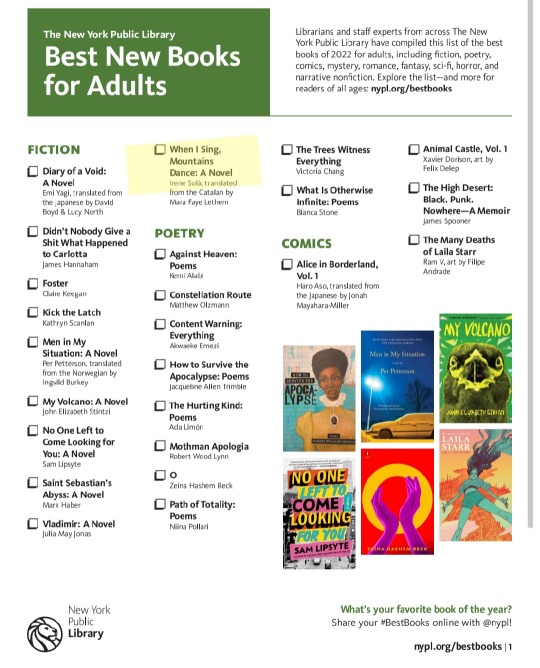
[You can read the full article by The Guardian here and download all 3 pages of recommendations by the NY library here.]
This is a great achievement, even more so taking into account that the English-language publishing industry is very closed in itself and books from other languages have a hard time getting attention in English-speaking countries.
The book (originally titled Canto jo i la muntanya balla) has also been translated to other languages including Spanish, Italian, French, Galician, Basque, Hungarian, Croatian, Macedonian, Serbian, Bulgarian, Turkish, Lithuanian, Danish, Portuguese, Dutch, Arabic, German, Greek, Korean, Polish, Romanian.
Enhorabona, Irene!
#canto jo i la muntanya balla#irene solà#literatura#arts#books#reading#book recommendations#bookblr#books and reading#library#translation#catalan#european literature#literature#pyrenees#best books of the year#best books of 2022#2022
130 notes
·
View notes
Text

canto jo i la muntanya balla - irene solà
3 notes
·
View notes
Text
Pero yo quería un hombre que amara la tierra y también las ideas. Un hombre que supiera de árboles, de plantas y de animales.
2 notes
·
View notes
Text
Mikor elmondok egy verset, utána mindig hagyok egy kis időt. A szavak visszhangja után, miután a hangom megérintett minden körülöttem lévő dolgot, és betöltötte a közöttük nyíló teret, elhallgatok. Hogy elválasszam a verset a világ többi részétől. És hallgatok. A költő szavakba önt. A költő kijelent. De hallgat is. Hallgatja a madarakat. A levegőt, mely újra átveszi az uralmat a levelek közti térben. Ahogy minden fül mélyén halkan süvít a világ…
Énekelek, s táncot jár a hegy (Irene Solà)
0 notes
Text
Reseña: “Te di ojos y miraste las tinieblas”, de Irene Solà (2023)
Te di ojos y miraste las tinieblas, de Irene Solà (2023, Cataluña, 🇪🇸). Editado por Anagrama, 176 páginas. Traducido del catalán al castellano por Concha Cardeñoso Sáenz de Miera.
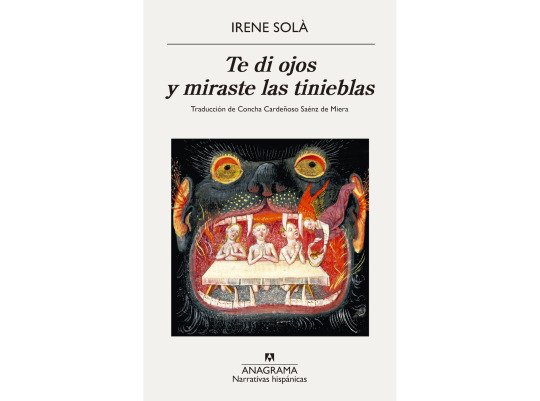
Recuerdo claramente escribir un tuit en algún momento de diciembre de 2019. Acababa de terminar Canto yo y la montaña baila, de Irene Solà, y no podía creer el libro tan maravilloso al que había llegado casi por casualidad, por el boca a boca de internet. Sin pretensiones de tener nada especial entre las manos. “En marzo no se va a hablar de otra cosa”, dije, medio en broma. (Al final sí que se habló de otra cosa). Tras Canto yo pudimos leer Los diques, otro libro maravilloso. Y cuando hace unos meses leí que ya había fecha de publicación para el tercer libro de la autora, no pude esperar. No sólo para que lo publicasen, sino para que lo tradujesen; Solà escribe exclusivamente (salvando cancioncillas, citas, y pequeños diálogos de castellanoparlantes) en catalán.
El libro ya está aquí: Te di ojos y miraste las tinieblas, publicado por Anagrama y con traducción de Concha Cardeñoso Sáenz de Miera. Una novela desbordante, extensa y concentrada, que recoge el paso de varias generaciones de mujeres (desde el siglo XVI hasta el presente) en Mas Clavell, una masía casi literalmente perdida en los montes catalanes. La acción principal de la novela, con numerosos afluentes narrativos que hemos de tratar de no mezclar ni perder de vista, transcurre en un solo día. Bernardeta, aprendemos, está a punto de morir y asistimos a su particular velorio, organizado por los fantasmas de todas las mujeres que nacieron y murieron en la masía. No quisiera desvelar nada, así que sólo diré que la voz tan particular que la autora ya nos cedió en Canto yo y en Los diques vuelve a aparecer aquí, con la ambientación que la caracteriza. Aprendemos, en forma de historias que se conectan y enlazan a través de varios siglos, sobre las vidas de esas mujeres que murieron allí, en Mas Clavell. Historias de bandoleros, de diablos (no tanto los del infierno sino los de la tierra), de promesas y guerras, de convivencia y cariño.
Las mujeres hicieron un corro. Joana, con el culo en la punta de la silla blanca, tumbó al animal en el suelo y le ató las patas con el cordel. Ángela, Elisabet y Blanca se agacharon y le pusieron las manos encima. Lo sujetaron. Se quedó quieto. Como si no supiera que las bestias pueden morir una mañana fresca rodeadas de manos de mujeres.
Solà apareció en el programa Página Dos de RTVE el pasado 18 de septiembre. Una de las cosas que me llamó la atención de la entrevista fue la premeditación con la que la novela está construida así. La autora, diferenciando la Historia (con mayúscula) de la historia (con minúscula), decide contar y reflejar el tipo de sucesos que no quedaron, en su mayor parte, en los libros que hablan de la época. De la vida doméstica, de las creencias y la mitología tan particular del entorno rural de la Cataluña de hace quinientos, trescientos, cien años. Y no es un ejercicio estilístico: hay toda una documentación detrás, una lectura de varios archivos históricos y estudios historiográficos que la autora recoge, a modo de bibliografía, como inspiración para las historias que cuenta.

Joan Sala i Ferrer, más conocido como Serrallonga, es el bandolero catalán del siglo XVI en el que se basa la figura de Clavell.
Así, el hecho de que la mayoría de las protagonistas sean mujeres, mujeres viejas, mujeres —también— muertas hace tiempo, mujeres feas y deformes, mujeres solas, es una decisión tan bien integrada en la novela que se hace imposible imaginársela escrita de cualquier otra forma. Una breve anotación al respecto: he disfrutado mucho del papel que juegan la cocina, las recetas y la comida en la novela. Dice Solà en la entrevista de Página Dos: "[las recetas] forman parte de esta reflexión alrededor de la memoria y del olvido, de cómo cocinamos ahora y cómo cocinábamos no hace tanto tiempo [...] Las maneras de cocinar tienen que ver con las maneras de relacionarse con el mundo, con las maneras de entender el mundo, de transformar el mundo de algo que no se puede comer a algo que sí se puede comer".
Yo siento una especial simpatía por Solà. Me parece una autora valiente, que no despoja la experiencia diaria de lo escatológico, ni de lo escabroso, ni de la bondad que asoma como una brizna entre la fealdad que abunda; y que ha adquirido rápidamente una voz tan propia, tan distinta, y que resuena tanto conmigo que se me hace difícil esperar a que siga escribiendo.
Porque hay cosas que no se pueden decir. Porque se pueden decir las desgracias, y se puede decir la pena, se pueden decir los remordimientos y la culpa, y se puede decir la muerte, y el dolor y las cosas que hacen los hombres. Las buenas y las malas. Pero no se puede decir cómo se hace una niña. No hay palabras para explicar cómo la hiciste, porque la hiciste como la tierra hace los árboles y los árboles hacen las ramas y las ramas hacen los frutos y los frutos hacen las semillas. A oscuras. Desde un sitio tan adentro que no sabías que sabías hacerlo.
Una novelita cuya corta extensión no impide que deje una huella profunda en el lector.
1 note
·
View note
Text

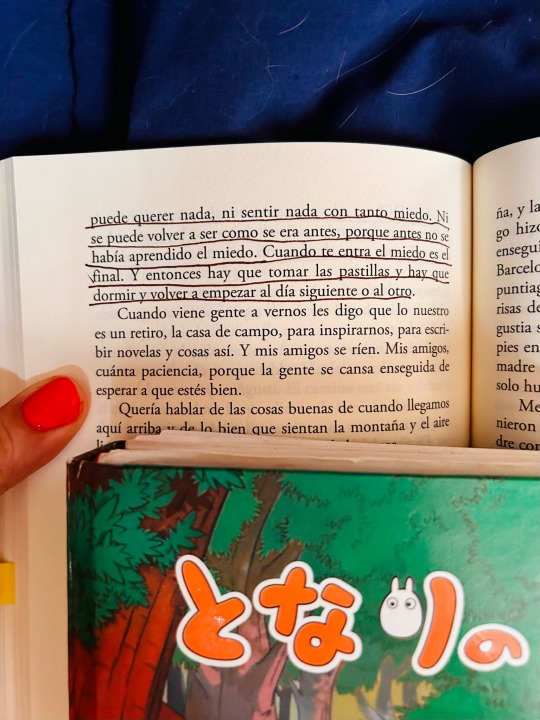
Un pedacito de Canto yo y la montaña baila, de Irene Solà.
1 note
·
View note
Text
Twitter -- Write Your Own Epitaph
Now that it seems Twitter is going to resort to its old flame-worthy self, I’ll be withdrawing even more from that particular platform. More than anything, it’s because Twitter has turned into Facebook in terms of its algorithms. I no longer see the people I want to see. Instead my feed is full of people the algorithm wants me to see due to the amount of engagement their profiles receive. I know a lot of you have worked hard for those blue checks, but I’m just not interested in 24/7 self-promotion anymore—yours or mine. It’s all become just so much noise.
I’m not leaving Twitter altogether just yet. I’m taking a wait and see stance, but if the past is any indication, it’ll devolve into people screaming, and I’m just done with that.
Frankly, I’ve pulled back from a lot of social media lately. I remember doom-scrolling one day and just wondering why was I bothering? Absolutely nothing I saw in my feed made me happy or even made me think. I’d just become numb to it all.
I pay to get my news through a reliable news source, so individual Twitter-takes are irrelevant to me. Having a large follower count or an even bigger bank account doesn’t equate to taste or intelligence, and I have better things to do than fan the flames for narcissists who need constant validation through clicks.
I’m on Facebook because of family, my job, and close friends. I also belong to several groups on Facebook and tend to spend more time in private groups than anywhere. Likewise with Slack—I’m in a couple of private groups there, and I tend to focus my energy in that direction. I run my blog posts through Tumblr, so if you’re still there, you can give me a follow there, as well.
I’m here at my blog and newsletter, and I’ll try a few new apps to see if something fits, but otherwise, I’ve resumed reading, watching television/movies that interest me, and writing. My anxiety levels have gone down and I feel calmer, and something else—I’m feeling much more creative.
I already follow several authors on their newsletters, so I won’t lose touch with the people I enjoy interacting with on Twitter. Insofar as my free time goes, I’ve simply found much better ways to spend it.
I’ve read several books in the last couple of months. Here are the ones worth mentioning:
The Indifferent Stars Above: The Harrowing Saga of a Donner Party Bride by Daniel James Brown — Probably the best and most thorough history of the Donner Party that I’ve read. It reads like a novel and is perfect in every way.
The Marriage Portrait by Maggie O’Farrell — History, fiction, and mystery all rolled into one, it is a certifiable page-turner that you will not be able to put down. Stay for the afterword, I promise you won’t regret it.
When I Sing, Mountains Dance by Irene Solà, Mara Faye Lethem (Translator) — This is a series of short interconnected vignettes about people in a village high in the Pyrenees, their lives, and their ghosts. Poetic and brilliant.
Black Mouth by Ronald Malfi — I reviewed this one in a previous post.
Helpmeet by Naben Ruthnum — A haunting little novella that is perfect for a cold autumn night.
In terms of movies and television:
Werewolf by Night — An absolutely delightful take on the 1940s horror films. The show had a lot of heart and a great cast.
Sweeney Todd: The Demon Barber of Fleet Street (1982) — This is the 1982 stage production with Angela Lansbury and George Hearn in the title roles. As I rewatched it for the first time in over thirty years, I found myself smiling with enjoyment and simply marveled at how wonderful and relaxed I felt. Nothing like a little play about a serial killer barber and his demented cannibalistic lover to bring perspective to my life.
She Will — I watched this over the summer, but I wanted to mention it, because it is horror and a wonderfully good one. It’s about old women and young women and healing. Very nicely done.
I’m currently reading Alex Bledsoe’s Dandelion, which is a great possession novel set in the rural south. If you’re looking for a cool series to watch, I highly recommend Cracow Monsters (Polish) on Netflix and I’m currently watching Guillermo del Toro’s Cabinet of Curiosities, because who isn’t?
Of course, I’m spending more time here on my blog and in the newsletter and writing my own stories. I have a short story that had too pat of an ending, and I think I’ve now discovered a way to fix it before I resubmit it. My horror novel is coming along nicely, and I’ve got a couple of other projects on the back burner that I’m working on as time allows.
So if you’re in interested, keep your eye out for me. If I land on a new app that fits me, I’ll give it a shout-out here. The best place to find me, though, will always be here and through my newsletter. I won’t blast every blog post through the newsletter, but I will do summaries from time to time.
Meanwhile, watch for me, and I’ll watch for you, as well.
#Daniel James Brown#Maggie O’Farrell#Irene Solà#Naben Ruthnum#Werewolf by Night#Sweeney Todd: The Demon Barber of Fleet Street (1982)#She Will#Dandelion Alex Bledsoe#Cracow Monsters#Guillermo del Toro#Cabinet of Curiosities
1 note
·
View note
Text
Necessito un bon diccionari de terminologia marinera (tant en l'anglès com en el català, per ser sincers)
#intentant d'escriure coses en català i/o traduir-les i soc aquí pregunant-me com diantres diries 'stern locker' en català#hi ha un parell de diccionaris al termcat (estimadíssim <3) però necessito una cosa més bàsica i senzilla#i preferiblement visual perquè tampoc sé on coi trobar totes aquestes coses o què hi passa#cada dia baixa el meu nivell de català....salveu-me irene solà i eva baltasar....irene solà i eva baltasar salveu-me.....#perce rambles#The Creative Endeavor and other aubreyad nonsense
2 notes
·
View notes
Text
i am a victim of hubris
#'i will buy the irene solà ebook#i said to myself#i won't care if i can't really read it#well. now i have bought it. and i can't really read it. and i feel stupid. but#it's ok. i can pretend to understand#she speaks.l#softcatalà about to be my best friend fr! (if anyone has better catalan-spanish or catalan-english dictionaries i would love recs)
3 notes
·
View notes
Text
twenty books in spanish, tbr
for when i'm fluent!! most with translations in english.
Sistema Nervoso, Lina Meruane (2021) - Latin American literature professor from Chile, contemporary litfic
Ansibles, perfiladores y otras máquinas de ingenio, Andrea Chapela (2020) - short story collection from a Mexican scifi author, likened to Black Mirror
Nuestra parte de noche, Mariana Enríquez (2019) - very long literary horror novel by incredibly famous Argentine journalist
Canto yo y la montaña baila, Irene Solà (2019) - translated into Spanish from Castilian by Concha Cardeñoso, contemporary litfic
Las malas, Camila Sosa Villada (2019) - very well rated memoir/autofiction from a trans Argentine author
Humo, Gabriela Alemán (2017) - short litfic set in Paraguay, by Ecuadoran author
La dimensión desconocida, Nona Fernández (2016) - really anything by this Chilean actress/writer; this one is a Pinochet-era historical fiction & v short
Distancia de rescate, Samanta Schweblin (2014) - super short litfic by an Argentinian author based in Germany, loved Fever Dream in English
La ridícula idea de no volver a verte, Rosa Montero (2013) - nonfiction; Spanish author discusses scientist Maria Skłodowska-Curie and through Curie, her own life
Lágrimas en la lluvia, Rosa Montero (2011) - sff trilogy by a Spanish journalist
Los peligros de fumar en la cama, Mariana Enríquez (2009) - short story collection, author noted above
Delirio, Laura Restrepo (2004) - most popular book (maybe) by an award-winning Colombian author; literary fiction
Todos los amores, Carmen Boullosa (1998) - poetry! very popular Mexican author, really open to anything on the backlist this is just inexpensive used online
Olvidado rey Gudú, Ana María Matute (1997) - cult classic, medieval fantasy-ish, award-winning Spanish author
Como agua para chocolate, Laura Esquivel (1989) - v famous novel by v famous Mexican author
Ekomo, María Nsué Angüe (1985) - super short litfic about woman's family, post-colonial Equatoguinean novel; out of print
La casa de los espíritus, Isabelle Allende (1982) - or really anything by her, Chilean author known for magical realism; read in English & didn't particularly love but would be willing to give it another try
Nada, Carmen Laforet (1945) - Spanish author who wrote after the Spanish civil war, v famous novel
Los pazos de Ulloa, Emilia Pardo Bazán (1886) - book one in a family drama literary fiction duology by a famous Galician author, pretty dense compared to the above
La Respuesta, Sor Juana Inés de la Cruz (1691) - i actually have a bilingual poetry collection from our favorite 17th century feminist Mexican nun; this is an essay defending the right of women to be engaged in intellectual work (& it includes some poems)
bookmarked websites:
Separata Árabe, linked by Arablit
reading challenge Un viaje por la literatura en español
#*#spanish langblr#langblr#spanish notes#can you imagine that if i grind i can start reading these this time next year?!?!?#3
138 notes
·
View notes
Note
Hi! Don't feel obligated to answer, but I've been learning catalan & I'd love to read some novels originally written in catalan, but i'm having a bit of a hard time finding ones that aren't 'classics'. Any recs? (I usually like literary stuff, like, authors irritatingly showing their skill, i eat that shit up, but anything contemporary or psychological or fantasy or anything will absolutely do :,) )
Oop sorry, I hadn't seen the message until now.
You won't have difficulty about this because Catalan literature is very lively and there's lots of great books coming out very often. Catalan literature has been praised around the world for having such vitality and quality, considering that it's a relatively small language community.
Personally the first recommendation that came to mind is Manuel de Pedrolo but idk if you're considering that a classic? He's relatively recent but many 20th century authors have become classics. His Mecanoscrit del segon origen is definitely considered a classic even though it's only from 1974, but I don't think the other ones are usually. Anyway, I really like his sci-fi short stories book Trajecte final, and my dad has spent years obsessed with his theatre play Homes i no. Talking about theatre scrips, I have a really soft spot for La cançó de les balances by Josep Maria Carandell ❤️.
I'm not usually one to read many short stories books but I also recommend Albert Sánchez Piñol's Homenatge als caiguts (stories of about 2 pages long and usually funny, very entertaining to read).
For a completely different vibe of short stories, I also thought El Cafè de la Granota by Jesús Moncada was excellent, the characterization and events feel like hearing your grandparents telling stories of when they were young. I still haven't read his most famous novel Camí de sirga though, honestly I don't know what I'm waiting for lol.
Canto jo i la muntanya balla by Irene Solà has also been very popular in the past few years and she definitely shows off her literary prose. I found it very lovely and I recommend it for when you want something more experimental. It's a book where each chapter is narrated by someone or something different (a shepherd, the rain, a witch who was killed centuries ago, a deer, a dog...) and it's very well written, it has also won some international awards.
And listen for some reason I still haven't read them myself (I plan to change that soon) but the best contemporary author is probably Jaume Cabré. I've only heard the highest praise for his Les veus del Pamano, and other of his books like Jo confesso. I'm planning to finally read Les veus del Pamano this summer and I'm very excited for it.
Another one I've heard lots of praise for and which I'm excited to read (hopefully soon) is Les històries naturals by Joan Perucho. I wasn't going to include books I haven't read besides Cabré (because, let's face it, with a question like this one must include Jaume Cabré) but since you asked for literary fantasy I think you might like it. It's about a knight/botanist who looks for one of Jaume I's knights who is a vampire.
Others that I've had recommended but haven't had time to read yet: Junil a la terra dels bàrbars by Joan Lluís-Lluís, Nicolau by Antoni Veciana, Guilleries by Ferran Garcia, and lots of people have loved Eva Baltasar's Permagel, Boulder and Mamut though it doesn't seem like my style they seem interesting.
I don't know if any of my followers wants to share some more in the comments/reblogs, but I'd be interested to hear them too 👀
59 notes
·
View notes
Note
What are your favourite Catalan books/literature?
Some of my favourite pieces of literature are theatre: El bon policia by Santiago Rusiñol and La cançó de les balances (by Josep Maria Carandell). I really like Rusiñol in general, I think he had a great sense of humour.
For novels, I know I'm very basic but Canto jo i la muntanya balla by Irene Solà (this one has been translated to English with the title When I Sing, Mountains Dance), La plaça del Diamant by Mercè Rodoreda (English translations have been published with the titles The Time of the Doves and In Diamond Square), and I also really enjoyed Victus (by Albert Sánchez Piñol, translated to English as Victus. The Fall of Barcelona, which is the only book that Sánchez Piñol wrote originally in Spanish instead of Catalan, but I'll include it because of the content/setting).
One of my absolute favourites is Trajecte Final by Manuel de Pedrolo which is sci-fi short stories. Other short story books I really liked are El cafè de la Granota by Jesús Moncada, everything by Pere Calders, and Homenatge als caiguts by Albert Sánchez Piñol.
And for poetry, Salvador Espriu without a doubt. I've also been reading some by Josep Piera that I'm enjoying a lot.
(I have not yet read anything by Jaume Cabré nor Joan Sales 🙈 I think it should be a priority to read Jaume Cabré at this point, there's a reason why everyone considers him one of our best writers of all times)
35 notes
·
View notes
Text
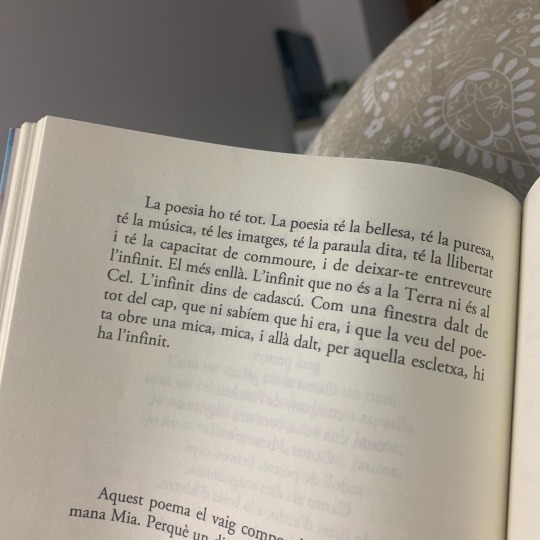
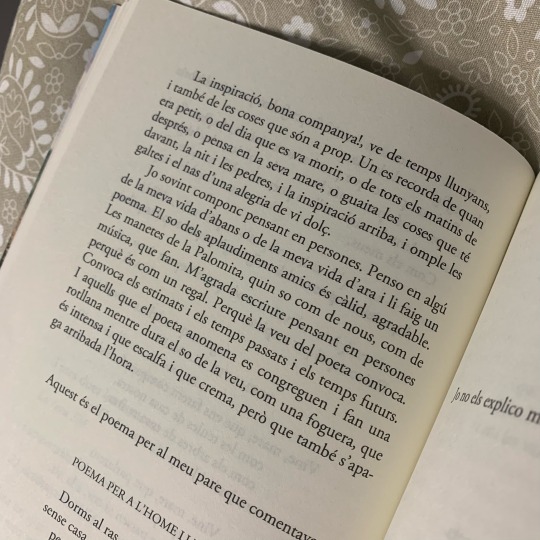
canto jo i la muntanya balla - irene solà 🪞🌲
#amor#gleekals#melodia de versos#love#mine#poema#palabras#poesía#citas#grunge#canto jo i la muntanya balla#irene solà#catalan book#reseñas literarias#citas literarias#cita literaria
0 notes
Text
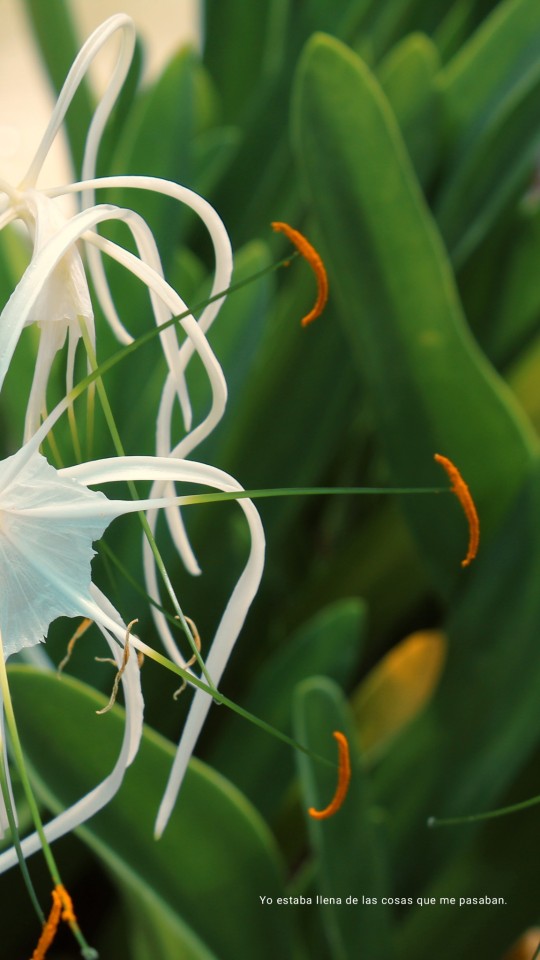
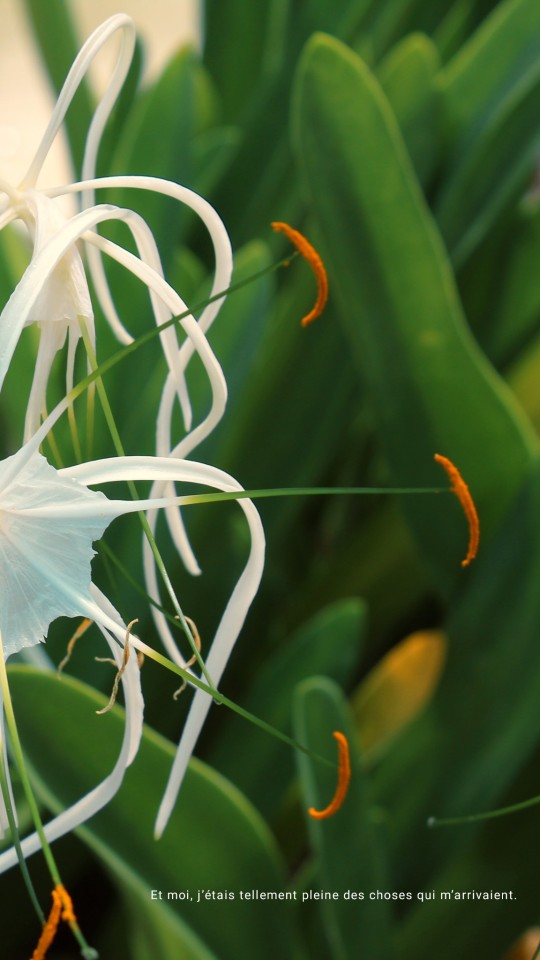

I was so full with the things that were happening to me
Irene Solà- When I sing, mountains dance.
#photography#flowers#photoart#beautiful photos#naturalista#photoblog#photooftheday#flores#flora#floral#when i sing mountains dance#Irene Solà
4 notes
·
View notes
Text




It has been a while since we last spoke, what can I say, I have been busy. I finished baccalaureate (the last year of highschool) and I am getting ready to do my uni access exams (basically like SATs).
Anyways, I've recently watched challengers and I am obsessed with it. I might try to go back to tennis (I stopped playing because I sucked). I've been running and doing a lot of cardio lately, too. I feel good. I recently read a catalan book called Et vaig donar ulls i vas mirar les tenebres by Irene Solà.
I'm going back to studying now.
Oh, btw I might start a youtube soon?
Love you,
Anna.
#girlblogger#pinterest#girlblogging#literature#that girl#dakota warren#alanabananaxox#fashion#coastal granddaughter#studyblr#fitness#tennis#challengers#wellness#healthcare#health and wellness#skincare#self care#spring#academia aesthetic
8 notes
·
View notes
Text
Where Toads Sing
read it on AO3 at https://ift.tt/ICt2PHJ
by lcswrts
Now, the heat is gone. The sun has already sunk to its resting place well below the mountains.
The warmth lingers, and the song of cicadas fills the evening air with something sweet-tasting. It is otherwise quiet, difficult as it would be for any man-made sound to find its way this deep among the sloping hillsides. There is birdsong, and there is poetry in the quiet of it all.
There is an old, rusted gate. It has, at some point, been painted over in the colour of pine needles, but old stains are difficult to hide.
Words: 1612, Chapters: 1/1, Language: English
Series: Part 2 of In Service of Fate
Fandoms: The Magnus Archives (Podcast)
Rating: Mature
Warnings: No Archive Warnings Apply
Categories: M/M
Characters: Martin Blackwood
Relationships: Martin Blackwood/Jonathan "Jon" Sims | The Archivist
Additional Tags: this is martin-centric, inspired by all the Lonely episodes, The Lonely Fear Entity (The Magnus Archives), Lonely Avatar Martin Blackwood, or something like that, Post-Episode: e200 Last Words (The Magnus Archives), Time Travel, or at least universe hopping, where does martin end up? spoilers: not anywhere fun, though I suppose that's debatable, there's a lot of, Nature, and very few things that are alive in any way that matters, there is also, Poetry, though not necessarily well written, possibly inspired by, Episode: e003 Putting Down Roots (The Magnus Protocol), I genuinely can't tell, Referenced - Freeform, Episode: e186 Quiet (The Magnus Archives), this funny little thing I like to do where, the universe-hopping changes the cast in horrible and irreversibly eldritch ways, Original Statement (The Magnus Archives), i guess, I promise poems but not rhymes ok, this is like the shitty ig poetry you get in those influencer books, in which allegory I myself am the dreaded influencer, COWER before my lack of rhymes. you fools, Inspired By, When I Sing Mountains Dance (Irene Solà)
read it on AO3 at https://ift.tt/ICt2PHJ
4 notes
·
View notes